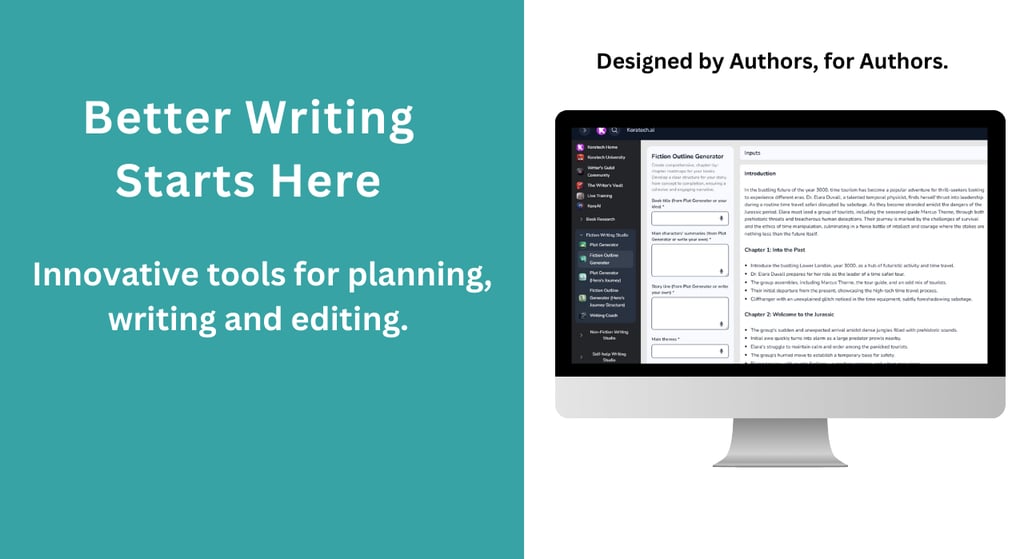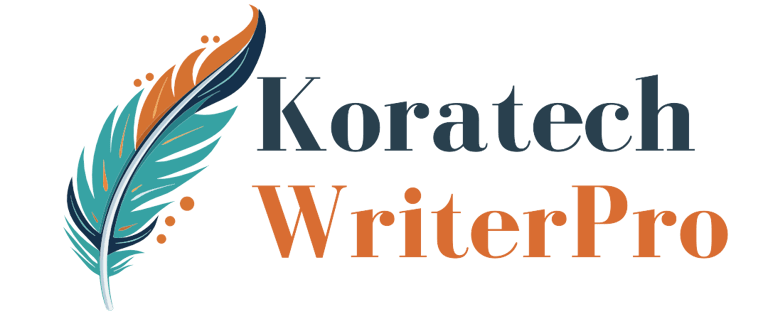Why 80% of Writers Use AI Wrong (And the Framework That Actually Works)
Platform founder reveals the three-layer AI writing framework used by successful authors. Real data, proven strategies, and insider insights on amplifying your voice without losing authenticity.
WRITING & EDITING


Why 80% of Writers Use AI Wrong (And the Framework That Actually Works)
After building Koratech Writer Pro and working with thousands of writers who've embraced AI in their creative process, I've seen the same fear surface again and again: "Will AI make me a worse writer?"
Here's what I've learned from the inside: The writers who thrive with AI aren't the ones who use it the most—they're the ones who use it the smartest.
The Real AI Writing Revolution (From Someone Who Built It)
When we first launched our AI writing tools, I expected writers to dive in headfirst. Instead, the most successful authors approached AI like master craftsmen selecting new tools—carefully, intentionally, and always in service of their greater vision.
After analyzing patterns from our user base and countless conversations with authors at every level, I've identified the exact framework that separates writers who flourish with AI from those who struggle.
The Three-Layer Approach: What Actually Works
Building AI writing tools taught me that successful AI collaboration happens in three distinct layers:
Layer 1: The Foundation (Where AI Excels) This is where AI becomes your research assistant and structural engineer. In our platform, tools like our Research Assistant and Course Outline Writer handle the heavy lifting:
🔹 Market research: Understanding genre expectations and reader preferences
🔹 Structural frameworks: Building solid outlines and plot architectures
🔹 Content organization: Arranging complex ideas into logical flow
🔹 Idea generation: Breaking through creative blocks with fresh angles
Layer 2: The Creative Core (Where You Lead) This is your domain—the place where human insight transforms structure into story. Even our most advanced KoraAI assistant knows its boundaries here:
🔹 Emotional authenticity: The feelings that drive your characters
🔹 Personal perspective: Your unique worldview and experiences
🔹 Voice consistency: The rhythm and tone that make you recognizable
🔹 Thematic depth: What your story is really about
Layer 3: The Polish (Where You Collaborate) This is where AI becomes your editing partner. Our Copy Optimizer and editing tools work with you, not for you:
🔹 Clarity enhancement: Making complex ideas accessible
🔹 Flow improvement: Smoothing transitions and pacing
🔹 Consistency checking: Catching details you might miss
🔹 Market alignment: Ensuring your voice reaches the right audience
The Data Doesn't Lie: What Our Users Actually Do
After tracking usage patterns across our platform, the most productive writers follow a surprisingly consistent workflow:
80% Human Decision-Making: They use AI for suggestions, then make deliberate choices about what fits their vision.
Strategic AI Deployment: They use our Writing Coach for feedback, not final drafts.
Voice Protection: They regularly return to their Character Creator and Plot Generator to ensure AI suggestions align with their original vision.
The result? These writers publish 40% faster while maintaining (and often improving) their distinctive voice.
Common Mistakes I See (And How to Avoid Them)
Mistake #1: Outsourcing Your Core Message Some writers try to use our Blog Post Writer or Course Content Module Generator to create their entire message. Wrong approach.
Better strategy: Use these tools to organize and structure your existing ideas, not replace them.
Mistake #2: Accepting AI's First Suggestion Our Magic Hooks tool generates compelling openings—but the writers who succeed treat these as starting points, not final answers.
Better strategy: Generate 5-10 options, then blend elements into something uniquely yours.
Mistake #3: Forgetting Your Reader Relationship AI can help with our Customer Persona Builder, but it can't replicate the connection you've built with your audience over time.
Better strategy: Use AI to understand market trends, then filter everything through your established relationship with readers.
The Founder's Framework: My Personal AI Writing System
Here's the exact process I use when creating content for our platform:
Step 1: AI for Research and Structure I use our SEO Keywords Analyzer and Marketing Strategy Advisor to understand what writers are searching for and what gaps exist in the market.
Step 2: Human for Core Message I write the central thesis, main arguments, and personal insights without AI assistance. This ensures the perspective is authentically mine.
Step 3: AI for Enhancement I run drafts through our Copy Optimizer for clarity and flow, but I make the final decision on every suggested change.
Step 4: Human for Connection I add personal anecdotes, platform insights, and direct advice that only comes from building these tools firsthand.
The Competitive Advantage You Can't Automate
After building AI writing tools, I'm more convinced than ever that your unique perspective is your greatest asset. Here's why:
AI can generate ideas—but it can't live your experiences AI can suggest improvements—but it can't understand your readers like you do AI can optimize for algorithms—but it can't create genuine connection
The writers succeeding on our platform understand this. They use AI to amplify their voice, not replace it.
What's Next: The Future I'm Building
The next generation of AI writing tools won't try to write for you—they'll become even better at writing with you. We're developing features that learn your voice patterns, understand your genre preferences, and suggest improvements that sound like enhanced versions of you, not generic AI.
But here's what will never change: The best stories come from human insight, enhanced by smart tools, and delivered with authentic voice.
The Bottom Line from Someone Building the Future
I've spent years creating AI writing tools, and here's my honest assessment: AI makes good writers great and great writers unstoppable. But it can't make a non-writer into a writer.
Your experiences, your perspective, your way of connecting with readers—these remain irreplaceable. AI just helps you express them more powerfully.
The question isn't whether to use AI in your writing. It's whether you'll use it strategically enough to stay ahead of writers who are still figuring it out.
Want to experience the strategic approach to AI writing? Our platform is designed specifically for writers who want to harness AI's power while protecting their authentic voice. Because the future belongs to writers who can do both.


